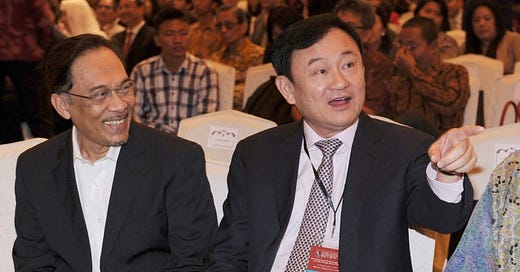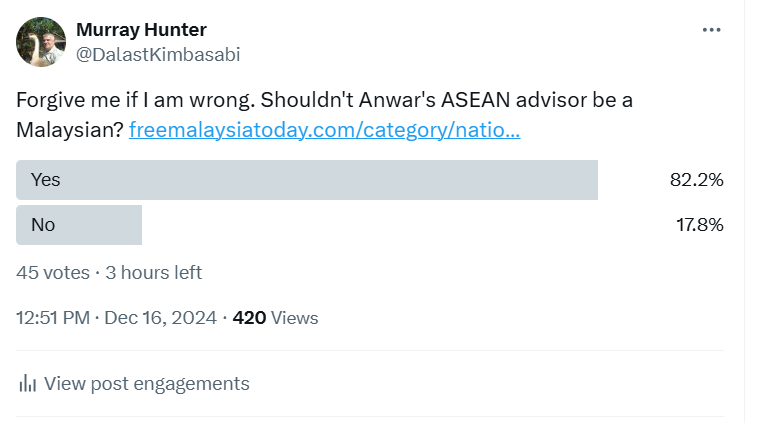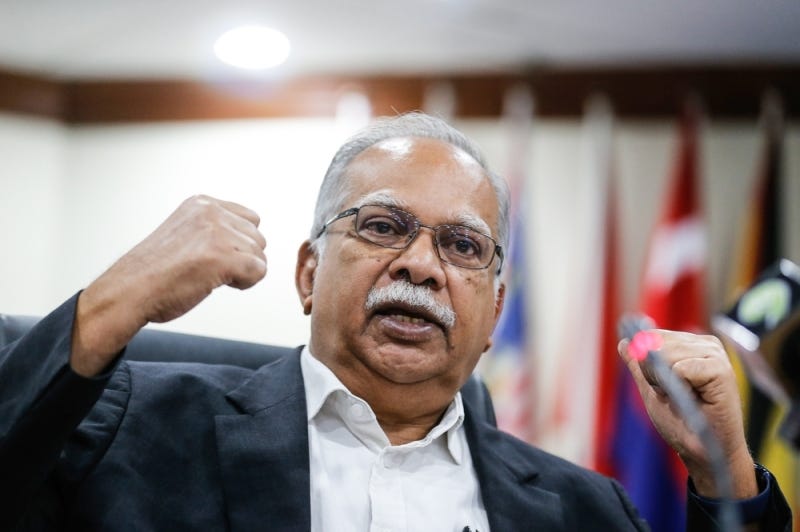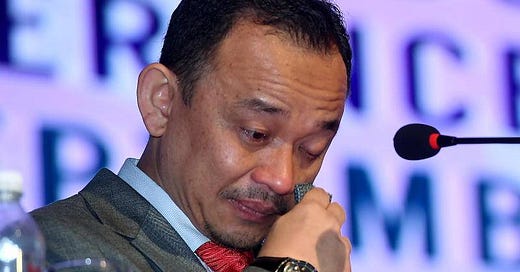
Guest Editorial: Anwar’s controversial move: Where is his nationalism in Asean Leadership?
Prof. Dr. Ramasamy
Anwar’s controversial move: Where is his nationalism in Asean Leadership?
Prime Minister Anwar Ibrahim’s decision to appoint former Thai Prime Minister Thaksin Shinawatra as his personal advisor on Asean matters raises serious questions about his respect for Malaysia’s own diplomatic talents.
As Malaysia prepares to assume the Asean chairmanship next year, this move has sparked concerns over national interests and the role of domestic expertise in shaping the nation’s regional strategy.
During the recent visit of Thai Prime Minister Paetongtharn Shinawatra, Anwar revealed to her—much to her appreciation—that Thaksin would serve as his personal advisor due to his “vast experience.”
Thaksin, once a popular leader in Thailand, was ousted by the military, spent years in exile, and only recently returned to Thailand, where he was imprisoned and later pardoned.
Notably, Paetongtharn is Thaksin’s youngest daughter, and her family’s enduring political and financial influence in Thailand is well-documented.
While Thaksin may have significant clout and experience, appointing him as an advisor to Malaysia’s leader on Asean affairs is problematic.
It suggests a lack of confidence in Malaysian diplomats and experts, many of whom possess extensive experience in Asean matters.
This move undermines the contributions of Malaysian talent at a critical moment when Malaysia is poised to lead the regional bloc.
Anwar’s approach is even more puzzling when juxtaposed with his staunch nationalism on other issues.
For instance, he took a hardline stance against former Prime Minister Tun Dr. Mahathir Mohamad for unilaterally withdrawing Malaysia’s appeal to the International Court of Justice regarding the Batu Puteh dispute.
Yet, in this instance, where is Anwar’s nationalism in ensuring that Malaysia’s interests are prioritized within Asean?
Asean is undoubtedly about fostering cooperation and mutual development among member states.
However, appointing Thaksin—a figure whose primary allegiance remains with Thailand—raises questions about how this decision aligns with Malaysia’s interests.
Moreover, the powerful Thai military, which has historically viewed Thaksin with suspicion, may perceive this appointment as politically sensitive. Could this create unintended tensions with Thailand, an Asean member?
Anwar’s decision appears driven by excitement and populism rather than careful deliberation.
Ideally, such a significant appointment should have been debated in Parliament to ensure transparency and consensus.
By bypassing these channels, Anwar risks alienating Malaysian diplomats and undermining national pride in favor of a controversial international figure.
Before this decision creates further complications, Anwar should reconsider and withdraw Thaksin’s appointment.
Malaysia has no shortage of qualified individuals with the expertise and experience needed to navigate the complexities of Asean leadership.
Elevating these homegrown talents would not only safeguard Malaysia’s interests but also demonstrate a commitment to national pride and self-reliance.
In this critical moment, Anwar must reflect on his priorities. Where, indeed, is his nationalism in advancing Malaysia’s role within Asean?
Added note:-
I took an X survey on the question of a foreign advisor.
Prof. Dr. P Ramasamy
Malaysian, 75 years of age. Former professor of political economy UKM. Former Senior Research Fellow, ISEAS. Former Visiting Professor, University Kassel, Germany. Deputy Chief Minister Penang, 2008-2023. Former member of parliament, 2008-2013. Three terms Perai state assemblyman. Former Chairman of Penang Hindu Endowments Board. Involved in peace talks in Aceh and Sri Lanka. International peace consultant. Chairman of political party Urimai.
Subscribe Below:
















Anwar continues to display questionable judgement, not just in this instance but in other, just as important, issues. His coy attitude to the Najib house arrest fiasco, his just announced 'Freedom of Information Act' (really, who does he think he's kidding?), and any number of other comments and actions that make the typical Malaysian question not only his sincerity but his common sense.
If this appointment was his first foray into the unusual it might be a different story. But it isn't. It seems designed solely to place the emphasis on how brave he is to buck the expected trend to appoint a fellow countryman as his advisor. But, No. He's Anwar! He knows more than everyone else. He's the smartest man in the room. He's playing 4D chess.
Malaysia clearly has a self-centered goofball as a prime minister.
This news item if true says a lot about Anwar but abuot Malaysia'dearth of qualified and intelligent people possessing the necessary expertise and experience to advise a prime minister the Regime Changers like Bersih, the DAP, PKR and the Malaysian Bar had long lobbied for. And if I were in Anwar's place (in which I am not) I too would have cast my net far and wide away from Malaysian waters.
The elevation of Anwar from prisoner to prime minister of Malaysia after decades of these Regime Changers lobbying, rioting and writing copious volumes of fantasy about the man's ability to walk on water and to now complain about his decisions, is embarassing and legend.